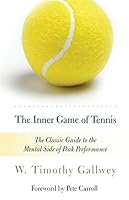
The Inner Game of Tennis

In most lectures that I have given recently, I remind myself and the audience that even though I come from California, I don’t believe in self-improvement, and I certainly don’t want to improve them. Sometimes there is a stunned response. But I don’t think anyone’s Self 2 needs improvement from birth to death. It has always been fine. I, more than
... See moreW Timothy Gallwey • The Inner Game of Tennis
Self 2’s needs come with a gentle but constant urging. A certain feeling of contentment attends a person whenever he or she is acting in sync with this self. The fundamental issue is what kind of priority are we giving the demands of Self 2 in relation to all the external pressures? It is obvious that every individual must ask and answer this
... See moreW Timothy Gallwey • The Inner Game of Tennis
It comes from being more independent—not necessarily more solitary, but more reliant on one’s own inner resources for stability.
W Timothy Gallwey • The Inner Game of Tennis
Freedom from stress does not necessarily involve giving up anything, but rather being able to let go of anything, when necessary, and know that one will still be all right.
W Timothy Gallwey • The Inner Game of Tennis
Maybe wisdom is not so much to come up with new answers as to recognize at a deeper level the profundity of the age-old answers. Some things don’t change. The need to trust oneself and grow in understanding of our true selves will never diminish. The need to let go of the lenses of “good–bad” judgment of ourselves and others will always be the
... See moreW Timothy Gallwey • The Inner Game of Tennis
Thus, there are two games involved in tennis: one the outer game played against the obstacles presented by an external opponent and played for one or more external prizes; the other, the Inner Game, played against internal mental and emotional obstacles for the reward of knowledge and expression of one’s true potential. It should be recognized that
... See moreW Timothy Gallwey • The Inner Game of Tennis
game. Today I play every point to win. It’s simple and it’s good. I don’t worry about winning or losing the match, but whether or not I am making the maximum effort during every point because I realize that that is where the true value lies.
W Timothy Gallwey • The Inner Game of Tennis
I used to think that if I was playing a friendly match against a player with a weak backhand, it was a bit unfair to always play his weakness. In the light of the foregoing, nothing could be further from the truth! If you play his backhand as much as you can, it can only get better as a result. If you are a nice guy and play his forehand, his
... See moreW Timothy Gallwey • The Inner Game of Tennis
state for returning it. You tend to react faster and move better, and by doing so, you make it more challenging for your opponent. You tend to build confidence in your opponent as well as in yourself and this greatly aids your sense of anticipation. Then at the end you shake hands with your opponent, and regardless of who won you thank them for the
... See more